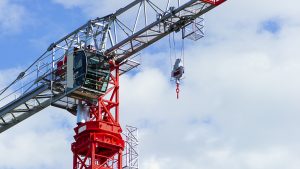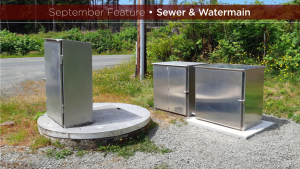The Labourers International Union of North America (LIUNA) recently released a white paper examining the impact of the Temporary Foreign Worker Program (TFWP) on the western Canadian labour force.
In addition to detailing the long history of the program, it also offered several case studies highlighting instances of TFWs being abused and exploited.
Following the release of the paper, LIUNA and union leaders in western Canada are calling on the federal government to review the program and its impact on construction in their region, claiming the industry was ignored in a recent parliamentary report.
One of the cases the study deals with is that of SNCP-SELI, a joint-venture contracted for work on the $2.1-billion Canada Line, a 19.5-kilometre Light Rail Transit (LRT) line linking downtown Vancouver with Vancouver International Airport and Richmond, B.C.
SELI Canada Inc. was owned by an Italian parent company and was specifically responsible for the project’s tunnel construction.
Pay stubs revealed that, unlike Canadian workers, the Costa Rican, Colombian and Ecuadorian TFWs were making $3.47 an hour, six days a week, at a minimum of 60 hours. They were responsible for assembling the tunnel boring machine and specialized tunnel work.
"The wages issues on the Canada Line project revealed the failure of federal and provincial authorities to enforce the labour code, employment standards, human rights laws, as well deal with the displacement of Canadian workers," stated the LIUNA paper.
The Construction and Specialized Workers Union (CSWU) 1611 launched legal challenges and discrimination complaints on behalf of dozens of the workers against the joint venture.
The workers were able to successfully organize and join the union. It was the first time this had happened in Canada. But according to the CSWU, the joint venture showed a pattern of activity intended to undermine their efforts to organize and negotiate a collective bargaining agreement. Complaints were made to the B.C. Labour Relations Board (LRB).
The board ruled against every complaint by the union. That decision was ultimately overturned by the B.C. Supreme Court which cited LRB bias against the union. In the end the workers were awarded millions for back pay, expenses and injury to dignity, the report notes.
The judge stated those in charge of the complaints at the LRB had minds that were "closed to the union’s complaint that unfair labour practices had, in fact occurred."
In 2008, the B.C. Human Rights Tribunal ruled the TFWs were victims of discrimination for being treated differently with respect to salaries, accommodation, meals and expenses.
LIUNA concluded in its paper that that "foreign companies should not be allowed to bid on public infrastructure projects in competition with Canadian firms and then employ TFWs under the most extreme conditions of abuse and economic exploitation."
Another case study used by LIUNA resulted in tragic consequences and details of the incident were only released after intense pressure from the media.
According to an 18-page investigation report, two TFW workers died at Canadian Natural Resource Limited’s (CNRL) Horizon oilsands site in 2007 due to poor safety measures.
SSEC Canada, a subsidiary company established one year before the incident to bid for work constructing 14 tanks, pleaded guilty to three charges in connection with the incident.
Originally, SSEC and CNRL faced a total of more than 50 charges, but nearly all were dropped or stayed. SSEC was ultimately given a fine.
According to the report, a supporting cable snapped after high winds and kinks weakened it. Nearby workers told investigators they heard loud bangs and pops when the roof collapsed.
Two workers were killed by falling steel — an electrical consultant was pronounced dead at the scene and a scaffolder, who was on the tank floor, died while being transported to Fort McMurray. Two other workers received serious injuries and three more workers received minor injuries.
According to court records and reports, the construction on the storage tanks was behind schedule, so SSEC and CNRL decided to build the walls and roofs at the same time. The site’s "confined space monitor" was poorly trained and was not competent to do their duties like raising an alarm or launching an effective rescue, the study notes. There wasn’t access to phones or radios and there was no communication with workers inside the tank.
According to the report, the monitor didn’t even understand what his role was or what was required of him during an emergency. The report also criticized SSEC for failing to have escape plans in its emergency procedures.
Investigators found SSEC and CNRL did not check if construction drawings had been signed and stamped by an engineer and workers were only given verbal instructions for how to build the tank roof.
The investigation into the deaths also revealed that TFWs’ paycheques were siphoned off by SSEC and the Christian Labour Association of Canada (CLAC) sued to recover them.
Efforts to obtain a meaningful public inquiry were derailed earlier this year by CNRL. The company was able to limit the scope of the inquiry only to whether an air ambulance should have been dispatched to take one of the injured TFWs to hospital, the report states.
"This was our last chance to get information, and frankly to get justice," said Alberta Federation of Labour president Gil McGowan in a statement to media at the time of the decision. "To say that I’m frustrated by big oil companies winning again would be an understatement. I say that I’m actually outraged."
Two other cases outlined in the paper, the Murray River coal mine project and the Golden Ears Bridge project, both highlighted the issue of TFWs being stranded or abandoned by their employers and Canadian workers being displaced by the introduction of TFWs.











Recent Comments
comments for this post are closed